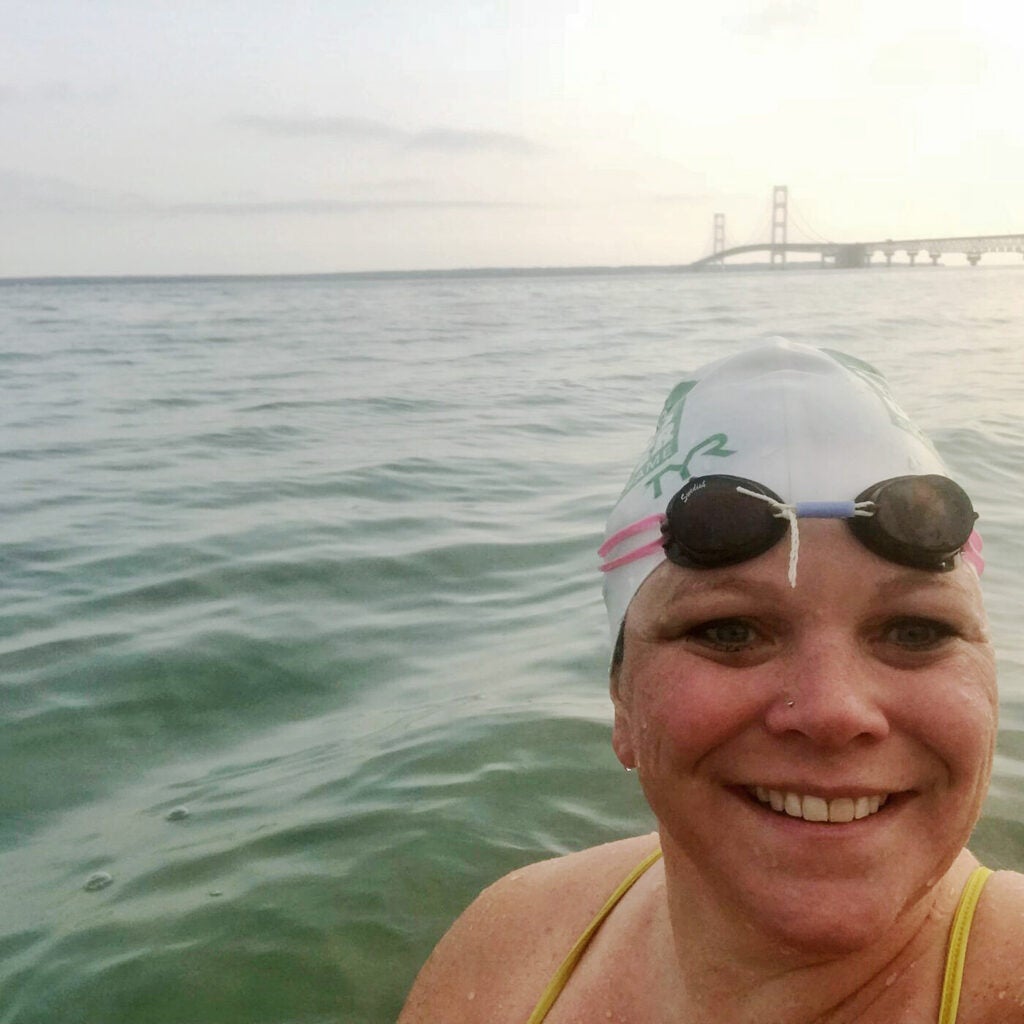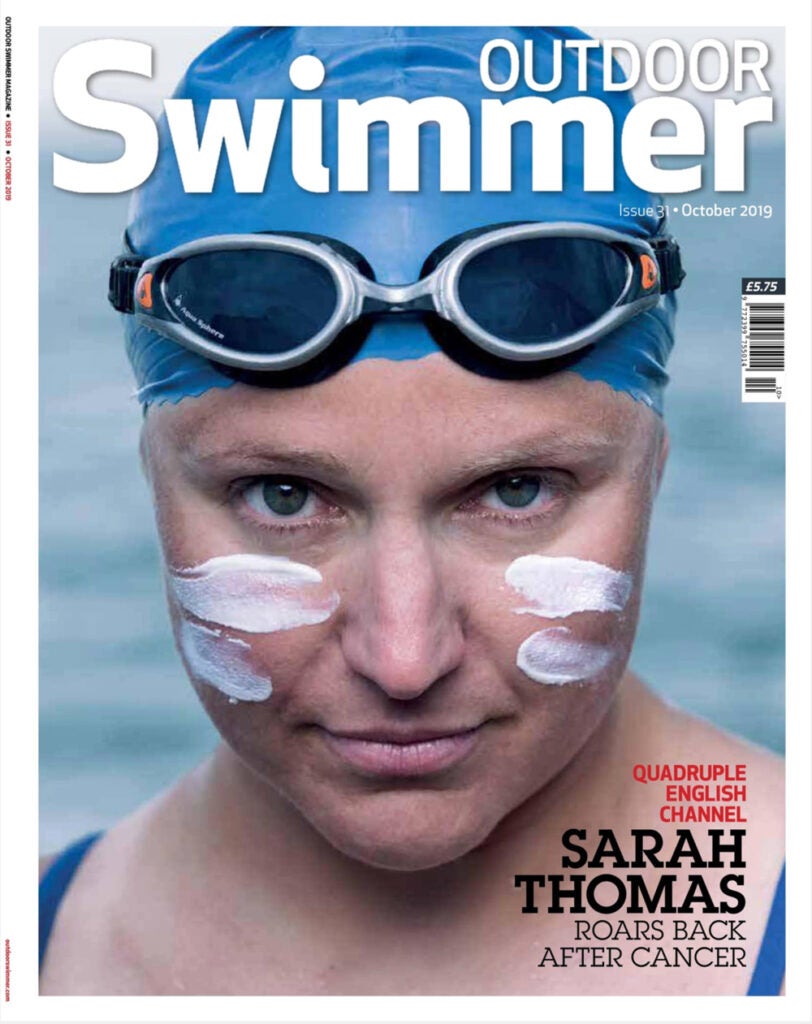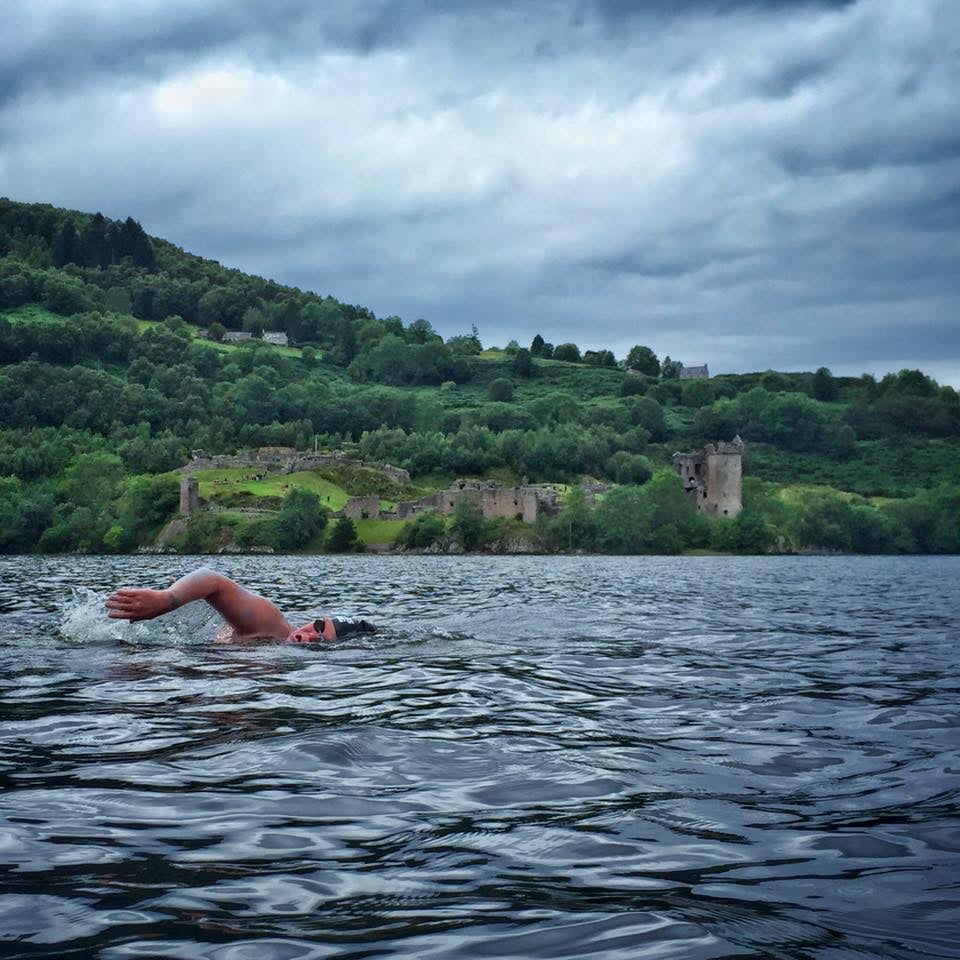Adventures, Challenges, and Learning From Failures: Journeying with Marathon Swimmer Elaine K. Howley
Posted in Announcements Aquatics Blog Fitness & Wellness Corner News
Emma Chuck (C’22)
Campus Recreation Communications Assistant

Georgetown grad Elaine K. Howley (C’00) is familiar with moving with currents: not only does she juggle several occupations as a freelance journalist, artist, and editor, but she also has years of experience as a marathon and ice swimmer. Her path in life and in swimming has never been a straightforward trajectory, but she shares what lessons she has gained along the way in an interview with Campus Recreation.
Her journey as a swimmer began because of her parents, whose own experiences with the water were, ironically, in contrast with each other: “My parents got me into swimming lessons when I was just a year and a half old. My dad was a good swimmer and had been a lifeguard in his younger days, but my mom was always terrified of the water and really wanted for me and my brother to have a more comfortable relationship with the water.” Soon after, Howley joined a summer swim team at five. “My older brother was on the team, and he loved it. So I followed in his footsteps as soon as they would let me. I did well in summer league swimming, and by the time I was in middle school, I was swimming year-round with a club team.”
“I was a decent swimmer, and broke a few pool records in summer league, but in club swimming, I wasn’t anywhere near the top. Still, I loved the training, and worked out with the faster kids, a good lesson in humility and the value of hard work.”
Howley said frankly, “I was a decent swimmer, and broke a few pool records in summer league, but in club swimming, I wasn’t anywhere near the top. Still, I loved the training, and worked out with the faster kids, a good lesson in humility and the value of hard work.” Howley’s high school swimming experience may not have been as high-stakes as the marathons she swims now, but her time on the team gave her an opportunity to evaluate and value her own unique strengths and weaknesses, tools that have helped her achieve. “I was elected captain of the swim team in high school, which was so much fun and a real highlight. I was a solid mid-pack performer, but wasn’t the top swimmer. I was elected captain because my teammates saw me as a leader and recognized that I truly loved the sport and the team.”
To Howley, having a yearning to learn and grow was a vital cornerstone of being an athlete. The same awareness allowed her to flourish on the Georgetown swim team, but the journey to joining took some time. “Despite my long career swimming already, when I arrived at Georgetown University, I decided to go out for the crew team. I wanted to try something new, and I wasn’t sure I’d be fast enough to make the swim team at Georgetown, so I joined the freshman crew. (My brother had rowed at the University of Dayton, and given that I have always had a bit of the sibling rivalry bug, I wanted to try it too.)
“I loved the sport, but found that the coaching and the interpersonal dynamics on the team left a lot to be desired. I was a very strong rower but was constantly reminded that I was ‘too short’ to go far in the sport. I stuck it out for the full year, and when I came back to campus at the start of my sophomore year, I decided to try out for the swim team. I was actually still going to crew practice, too—I knew I wanted to stay an athlete in college, so I didn’t want to forfeit my spot on the crew team. So I hedged my bets and for about 2 weeks there, I did both. It was exhausting! Finally, I got the word that I’d made the cut for the swim team, and it was one of the most exciting moments in my life. I already knew I loved the other team members and I couldn’t wait to get back in the water for real.
“Still, I knew I wouldn’t be a top point-earner, and so did Beth [Bower], the coach. She gave me a shot, though, because she saw a workhorse who would be a great team player and help support the other shining stars on the team. I’ll forever be grateful that she recognized the value I could bring to the team and allowed me to join them.” Howley was a member of the Georgetown Varsity Swim Team from 1997-98 and 1999-2000.
At Georgetown, Howley studied German and Studio Art—an unusual combination. “I had no idea what I wanted to be when I grew up, and in high school, I had loved my German class and teacher, so decided to pursue that.” Art led to a creative side for her as well: “Exhibiting my works in the senior exhibition was a real thrill, and I just loved so many of my classes at Georgetown. It truly was a well-rounded education and I feel very, very lucky that I was educated there.”
However, the post-college period led to a crisis for Howley, who rode out a period of difficulty after returning from serving in the Peace Corps in Ukraine. “I was lonely and felt underprepared to do the job I was there to do. I came home after about a year and moved to Massachusetts to live with my brother since I had no job, no money, and no home of my own. I had a little bit of a quarter-life crisis. I finally got my act together and pursued a Master’s degree at Emerson College in Publishing and Writing.” Although Howley was juggling a full plate of working and going to school full-time, she said, “Getting that degree opened some career doors for me that have helped me get to where I am today.”

Now, she has found her stride as a freelance journalist and writer. “I do a lot of health and sports writing, but my favorite beat is history. I write a feature article about the history of swimming for every issue of a UK-based magazine called Outdoor Swimmer, and I’m currently ghostwriting a memoir for an Olympian. It’s been really great work, but it took a long time and a lot of struggle (not to mention bad jobs and bosses along the way!) to find my place.”
Acclimating to the flow of the journey and learning along the way is a direct connection to Howley’s swimming accolades, which are extensive and impressive (not including what she accomplished prior to and during college): “I was just finishing up my graduate school work and was ready for a new challenge.
That’s how I ended up doing my first marathon swim, the Boston Light Swim, in 2006. It was an incredible experience and after that, I began looking for other events and solo swims I could do. I had caught the bug and I was off and running—err, swimming.”
Howley has maintained a consistent diligence in trying to improve, continuing the drive she gathered from previous swim teams: “My training really depends on the time of year, the swim I’m preparing for, and how much spare time I have to spend training. Leading up to one of my longest swims, the 32.3-mile length of Lake Pend Oreille (I was the first person to swim the length of that lake solo) I was swimming at least 15 to 20 hours a week, running, lifting weights, and rowing. I was in savage good shape for that, but it soaked up a lot of time—at least 3 hours a day. It’s hard to keep up that pace all the time.”
She has had to reckon continually with tough conditions: “Loch Ness was far and away the hardest swim I’ve ever done. It’s a 22.2-mile swim. The water ranged from 51 to 54 degrees Fahrenheit, so it was very cold. I was hypothermic at the end, and at times I wasn’t sure I’d be able to finish. It took 13 hours and 21 minutes to complete it. It’s still the swim I’m most proud of having done—only 24 people have ever completed it—and I’m still not 100% sure how I managed to pull it off. It was beautiful, and hard, and while I didn’t find Nessie, I sure do feel a kinship with her as a result of spending so much time in her Loch!”
“If we were guaranteed to get there every time, what would be the point in doing these swims to begin with? Failure and challenge is just part of the journey, and you just get on with it.”
Unavoidably, not all swims result in success. Howley shared, “Certainly, there have been struggles and there have been events I haven’t been able to complete. Struggles in training and completing swims have cropped from time to time, but none of that’s surprising. If we were guaranteed to get there every time, what would be the point in doing these swims to begin with? Failure and challenge is just part of the journey, and you just get on with it.”

An example would be her North Channel swim, which she did not finish. Howley said, “There have been a few swims I’ve failed. My attempt to cross the North Channel in 2013 ended after about 5 and a half hours. I was roughly halfway across (this is between Northern Ireland and Scotland), and I was being stung continually by lion’s mane jellyfish. The water was 52 degrees Fahrenheit, and I was so cold. After several hours of being stung, I just couldn’t take it anymore, so I got out. It was a difficult day, but better to get out and live to try again than get myself into real trouble or seriously hurt. I hope to go back someday to try again, but for now, I’m focused on other goals.”
Just like the great professors at Georgetown that Howley learned from and continues to praise, she has had mentors to spur her on, too. “The first person I should mention is Pam O’Neill, the woman who browbeat me into getting back into the pool after a 5-year layoff. She helped me find my way back to the water and introduced me to so many fabulous folks who opened other doors for me.”
“My friend Lisa Mikkelsen was also an enormous help early on. When I first got into marathon swimming, I didn’t know much about endurance sports and how to train for them, how to eat, when to sleep, and all that stuff. Lisa is a gifted endurance athlete who helped orient me around navigating this next level of athletics. She was on my crew during my very first Channel swim, across Catalina in 2008, and is still one of my very closest friends.
“My coach now, Jen Dutton, is a fantastic marathon swimmer and stroke technician who’s really helped me iron out some of the flaws in my stroke. She’s also been super supportive as I’ve aged and had to come to terms with how I’ve slowed down—I was never terribly fast to begin with, but being unable to hit intervals I used to take for granted took some adjusting to. She’s helped me learn to cope with those inevitable changes with grace. As an ultramarathon swimmer herself, she gets it and understands my goals better than I do sometimes, and it’s great to have her helping me.”
“Controlling your mental state is a big component of success, and I’ve had to learn to modulate my mind when the going gets rough. On a good day, a long swim becomes a moving meditation where time doesn’t mean anything anymore and I’m just at peace with the water and moving through it.”
The activity has brought friends and mentors, lessons and challenges, and a peace of mind: “I feel a lot of different emotions when I swim. Sometimes I’m happy, other times I’m sad and frustrated. It just depends on how things are going. Controlling your mental state is a big component of success, and I’ve had to learn to modulate my mind when the going gets rough. On a good day, a long swim becomes a moving meditation where time doesn’t mean anything anymore and I’m just at peace with the water and moving through it.”
Underneath all the physical and mental preparation, passion for swimming is at her core. Howley said, “Ultimately it comes down to a combination of the innate adventure and challenge of long swims and the community of like-minded folks I’ve found who also do these things. They’re fun, supportive, and impressive people who I’m pleased to call my friends.”
As for Howley’s current swimming status, “The [COVID-19] pandemic cancelled several events I was planning to do in 2020 and I’ve had to adjust to doing less than I’d like for the time being. That’s all part of the journey, though, to adapt to changing conditions and rolling with the punches.” Whatever stormy weather she encounters, swimming has given Howley valuable lessons: “It’s taught me to be patient. It’s taught me to value good help when it’s offered. It’s taught me to think bigger, and I’ve learned how to set goals and execute a plan for success. It’s also taught me that the destination is never the real reward—it’s always the journey and the friends who join you on that path that are the real prizes.”
